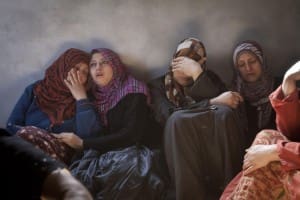The old man who lives above me on the third floor calls out for his aide, his voice muffled by the concrete that separates us. The elevator opens and closes delivering children from the fourth floor to the foggy street where they walk to school “as usual.” But nothing is usual. Not even in Jerusalem, far from rockets and bombs. Even my neighbor’s rooster crows an uneasy and foreboding sound.
Just a few weeks ago we were complaining about the calm. “Nothing is happening,” friends said. “This occupation will go on for decades if we don’t do something.” At that point, we wanted the youth to take to the street. We wanted the world to pay attention. And now they are, but what will come of it?
“What should we do?” another friend of mine asked yesterday. A palpable helplessness traversed the phone line in both directions. Most of us here know someone in Gaza. We can visualize young parents, their in-laws, aunts and uncles, children, all huddled under a dirty blanket in the corner farthest from the windows, their lips moving in prayer, even if they never prayed before, and trying, against all forces, not to cry in front of the children, because isn’t the worst thing a child can experience the look of terror on their father’s or mother’s face?
I am glued to Aljazeera just like you are. The kitchen smells faintly of the unwashed dishes that are piled on the counter, and I have trouble finding my sweater in the mess of sheets piled on the bed. There are so many, many things to do. I should write. I should read. I should demonstrate. I should shout, demand, shake some sense in the people firing on 1.5 million people in the prison that is Gaza, and I should do my best to dislodge their confusion, stop the madness, remind them of their humanity.

But there is no stopping a war during a war.
We must protest, and it will make a difference, but it’s not enough.
I’d like to get this message out: it’s important to give support and sign petitions. I’m doing the same. But it’s not enough. We must prevent the next attack, and the one after that. So many lives can be saved, and so much fear avoided if we do the much harder work of war prevention. Now.
Preventing war is not an impulsive act of compassion. Preventing war is an ongoing commitment to fighting injustice and inequality wherever it exists. It means that in those periods of calm, the times when we let our attention be diverted to deadlines at work and soccer competitions, in those months and years when Israel and Palestine seem so far away and not in need of attention – that’s exactly when your attention is most needed.
Let us be a visible part of the constituency for peace with justice, make bold claims on the public discourse, watch the powers that be and let them know that we are watching. Let us develop real relationships with people on the ground, support activists, connect the issues in our minds and in our lives. Our actions matter.
And let’s start now to prevent the next war. Yes I’m talking to you. And I’m talking to myself, too.
You’re so right, Nora. “There is no stopping a war during a war.” We all need to avoid taking the calm times for granted. We need to meet them head on with gratitude and appreciation whenever and wherever they appear, and use them wisely to move forward by sowing the seeds of peace. As you said so well: “Our actions matter!”
Stay safe!
Oh gratitude! Where are you, gratitude?
Well said, Nora. We’re all fighting on one front or another in this conflict, even if it’s just to speak out to the people around us. In my small corner of the UK, I’ve currently got a Jewish business partner who wants me to agree to leave the Co-operative Bank because it’s food retailing arm has taken the ethical decision to boycott companies selling Israeli produce from settlements in the West Bank; a friend who can’t bear to hear me arguing for Palestinian rights… presumably because to her mind it’s a zero sum game, and her theology tells her that Israel must have unconditional support; and a nephew who thinks someone should just “bang heads together” and make the two sides be nice to each other. No, he’s not six, he’s 35 and should know better! If talking to people like these is all we can do, then we must do it.
That is important. How’s that going? 🙂